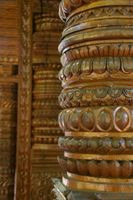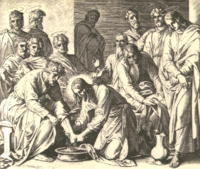I went to see War of the Worlds the other day and it made me think about the hero archetype. A little googling and here is what I found (this by Shawn J. Wittmier
* ):
The Archetype of the hero in modern myth and media is one that is a fairly set pattern. In order to have a successful heroic figure, the tale must follow along these lines:
- The hero usually suffers a great loss, which makes him set off on a quest.
- The hero generally has a mentor or helper who helps him on his quest.
- The hero must face a set of trials, which allow him to overcome "evil".
- The hero narrowly escapes death, usually more than once.
- The hero escapes the "evil villain's" stronghold or destroys him.
- The hero is then reintegrated into society with a new status, wealth, or marriage to the princess.
- There has to be a happy ending.
What is more the author suggests that movie viewing public will keep flocking to see movies that promise the viewer this archetype. Sure enough, War of the Worlds shared this archetype in Tom Cruise's character. He suffered from a great loss - his world is literally turned upside down by alien invaders. The hero didn't have a mentor but one can argue that this is not really a problem for our model. You can have a hero starting out on his quest (like Frodo of Lord of the Rings) who would need a mentor but Tom Cruise's character is middle aged and presumably has had his mentoring all taken care of in some unexplored past. The hero definitely has many trials to deal with in this movie, chief among them trying to keep his two children and himself safe from very unfriendly aliens who seem hell bent on exterminating all human life on earth. The hero definitely escapes from death time and time again with almost metronome like regularity, facing danger at every turn. The hero in War of the Worlds is instrumental in defeating a hitherto undefeatable enemy - though he is not responsible for their ultimate defeat. I suppose the next aspect of the hero archetype doesn't really take place in this movie unless you argue that reuniting with his family at the end as a reintegration of sorts. More generally the defeat of the aliens allows for a literal reintegration of soceity as a whole. Does that count? Finally, as in most hollywood fare, the ending is ridiculously and unrealistically happy.
So anyways this started to make me think more about the
modern hero archetype and what other aspects can be added to this list and why we respond to it and why we are attracted to heroes in general. I think to the list above we can add certain modern archetypal characteristics. There is the reluctant or awkward hero (like Harry Potter or Frodo). The hero called to action through circumstances but not through design or ambition (in a recent movie Dawn of the Dead the hero was a TV salesman). What's a TV salesman to do when the dead come back to life? Presumably this isn't normal training for a TV salesman.
Then there is the competent or expert archetype. Our heros are often expert at some aspect of their life. They are rarely out of work. They are committed to their work, sometimes too commited so other aspects of their life suffer. In War of the Worlds, Tom Cruise's character is an expert mechanic even though that's not what he does for a living (he loads containers at a dockyard though he is expert at that too!). There are exceptions to this archetype of course. It's hard to argue that Frodo or Harry Potter are experts but these heros are the ones that are in need of a mentor to presumably pass on some useful expertise to be used on their heroic quests.
Modern heroes also seem to revel in being imperfect. They often have failed marriages (Both Tom Cruise in War of the Worlds, and Bruce Willis' character in Die Hard are divorced), may have a drinking or swearing problem (like Clint Eastwood's character in Unforgiven) and may not exactly be likeable people in some ways, though naturally have a rogueish charm. Some may appear geekish and awkward (for example Harry Potter comes to mind). In this way, the hero appears approachable to us. We too can be a hero because we are not that different from them - we too are manifestly imperfect. The modern hero archetype has certain other qualities in common. They don't give up and are rarely reluctant when the proverbial shit hits the fan. That's when they move into action and the action is often relentless and they appear undeterred by set-backs. They are stubborn, a quality that all heroes seem to share and they are uncompromising in the pursuit of what they think is right. It is this stubbornness that I believe translates to that quality we most associate with heroism - bravery. A brave person is just someone not willing to back down from a position that they believe to be right. They always have a choice to make and they make choices that are hard but are invariably the right thing to do. In High Noon Gary Cooper's character plays the reluctant hero that has a choice to flee with Grace Kelly to safety or stay and save a town that has turned their back on him out of a sense of self-preservation. He chooses to stay. He chooses to stay even though Grace Kelly's character threathens to leave him if he does. He would naturally not be seen as a hero if he did the sensible thing and left. How can one contemplate leaving Grace Kelly? Being a hero clearly involves great sacrifce and grave risks.
An archetypal modern hero is also good looking. This is perhaps the least rational of our hero beliefs but it is hard to believe in a hero that is fat and unattractive though what looks has got to do with heroism is unclear. Our mind is so used to thinking in these ways that when exceptions to this rule happen in real life we have trouble accepting it. Richard Jewell,

the security guard who found a pipe bomb in the 1996 Atlanta Olympic games was later thought to be the chief suspect in the case. I think it can be argued that one of the reasons he was a major suspect was that he fit a profile that goes against our notion of what a hero looks like. Mr. Jewell is overweight, and not particularly attractive. He was deemed to fit the profile of an anti-hero as it were.
I'm sure with a little thought one can think of more qualities of the modern hero but I'm not really trying to write a thesis here just put some thoughts down. So the modern hero archetype is an interesting contrast of being approachable, the guy next door, that does extra-ordinary things under extra-ordinary circumstances.
However it occurs to me that being a hero that doesn't fit the mold would make for a very interesting and realistic story. Life is full of "heroes" like Mr. Jewell, that don't fit the mold. In Unforgiven, Clint Eastwood's character is a reluctant hero in more ways than one. He is not a good man to begin with and his "quest", though noble (he is going after the men that cut up a whore and the Sheriff that protects the perpertrators because they are "good old boys having some fun" and these are just whores after all) is taken on for a very ignoble reason - for money. Yet he claims that his wife's influence has changed him - he is less evil than he was before though no less deadly. He blames alcohol for most of the killings he was responsible for and doesn't remember most of those he has killed. He was a killer of women and children. The love of a good woman can be seen as his "mentor". The complexity of his character is one of the reasons that make the movie so good and perhaps leads us to feel less than satisfied with cookie cutter hero archetypes like Cruise's character in War of the Worlds.
In the end I think its interesting to think of the hero archetype because it tells us what we admire about ourselves. I have been referring to the
modern hero archetype because the archetype itself changes across time and tells us of what we value as a society today. Apparently we can stomach a hero that looks like Harrison Ford much more so than we can one that looks like Richard Jewell and perhaps that itself is a reason to question our notion of heroes.
Finally, consider another kind of hero. Mother Theresa spent her whole life working with the poor and unwanted in the slums of Calcutta. She too no doubt faced many dangers and hardships on her quest to provide the forgotten a small measure of respect before they met their end. I think the evil she fought was the apathy of human indifference to the suffering of those that cannot benefit you in any way. And in the end she spent her whole life being a champion of the poor. A most unlikely hero, a small woman of homely features and unprepossessing manner. She was a hero in the very best sense of the word. When she died (Sept. 5th, 1997) the world mourned the passing of a giant of the 20th Century. Yet Princess Diana died a few days before Mother Theresa did (August 31sth, 1997) and the coverage in all the media was considerably larger and the outpouring of a sense of loss appeared to be larger as well. This too reflects on us as a soceity doesn't it? Perhaps it was because we felt that Diana died well before her time (after all Mother Theresa was 87) and perhaps we felt sorry for her troubles. We can identify with someone like Diana more than we can someone like Mother Theresa who's goodness seems other worldly.
I just don't know but it felt wrong somehow.
* For the complete article see this
link.








